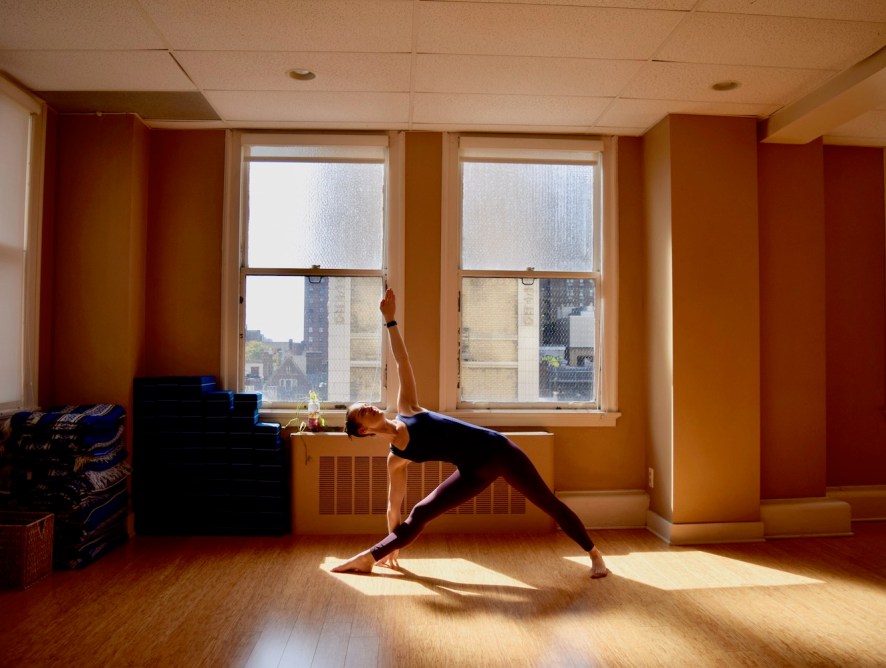Thanks to back-to-back classes, internships, and a full calendar of social events, college can be overwhelming to say the least. If you’re looking for a solution that will help you maintain your sanity, incorporating some namaste into your day could be just what you need to make it through even the most challenging semester. Practicing yoga provides both mental and physical health benefits, and can help strengthen your body in more ways than one. Whether found in the positive atmosphere of the yoga studio or by recognizing the strength within our own bodies at home by streaming a tutorial online, we all can reap the rewards of the practice. Read on to find out some of the most tangible mental and physical health benefits you can achieve ASAP.
Reduces anxiety: According to Byrdie, the breathing exercise known as Nadi Shodhana helps de-stress both sides of your body by alternating breaths through each nostril for 12 rounds to enter into a calmer state. This can help increase the flow of oxygen to the brain and help you feel your most zen.
Improves balance: Iyengar yoga (also known as “furniture yoga) is known for its “extreme emphasis on alignment and sustained poses,” according to Byrdie. An added bonus? This can also strengthen your core and straighten your posture—a huge plus for those of us who sit at a desk in class or an internship all day.
Prevents acne: According to Well + Good, the breathing meditation Pranayama can be “deeply balancing to the mind and body, alleviating the stressors that cause acne.” This can be an all-natural (and much cheaper!) alternative to an expensive facial or skincare product.
Removes toxins: Yoga, but especially hot yoga, forces you to sweat, which flushes out toxins and de-stresses your mind, according to Byrdie. If you’re trying to knock out some exam stress, this relaxing exercise is a perfect solution.
Boosts mood: If you suffer from depression, taking the time to stretch can aid in alleviating feelings of sadness. MindBodyGreen explains, “Stretching releases endorphins and can increase the flow of oxygen-rich blood. Taking time to do yoga poses throughout the day will improve blood circulation and your mood.”
Increases energy: Prevention describes the “extended length and movement” of yoga poses as being beneficial in building and sustaining “energetic highs.” Hold poses for up to 20 minutes to reap the energy-boosting powers of each position.
Decreases bloating: If you’re experiencing stomach troubles, specific movements may offer relief. Health describes certain stretches, like bridge pose, as a way to “stimulate your abdominal organs” to help ease digestion.
Teaches you how to set boundaries: As Yoga Journal explains, the practice of yoga requires you to listen to your body, which allows you to “find your natural limits” and learn to “develop strong boundaries.” This can help you tune in to body needs and become more capable of voicing your needs to others.
Relieves PMS symptoms: Byrdie writes that specific positions like child’s pose ease pain in the lower back and belly. Since PMS is not f-u-n, taking breaks in your day to practice yoga can help you make it through the worst part of the month.
Increases your ability to focus: According to Huffington Post, you only need a few minutes of flow to help your brain function better. “Researchers found that people did better—both speed-wise and accuracy-wise—on brain functioning tests after just 20 minutes of Hatha yoga, compared with aerobic exercise.”
Promotes better sleep: While it may not be the best idea to add power yoga to your bedtime routine, a light yoga practice could help you sleep better at night. That’s because stretching and non-intense poses can release tension and help you relax, according to Elite Daily.
Acceptance of body image: Through judgement-free zones and increased self-awareness, yoga can help you show more kindness to yourself. As Well + Good explains, “Yoga can benefit individuals of all different ages, shapes, sizes, and abilities because it’s not just a physical practice. When we quiet the mind, we can more deeply understand and appreciate the body.”
Helps you tap into your values: Yoga doesn’t stop when you leave the mat; you can incorporate what you learn into every part of your life. Yoga sutras, or sayings that we can tell ourselves at the beginning of our practice, help ground us in our core values and navigate modern life, according to Well + Good.
Do you practice yoga regularly? Let us know your favorite benefits in the comments below!
Featured photo by Claire Wolters.


